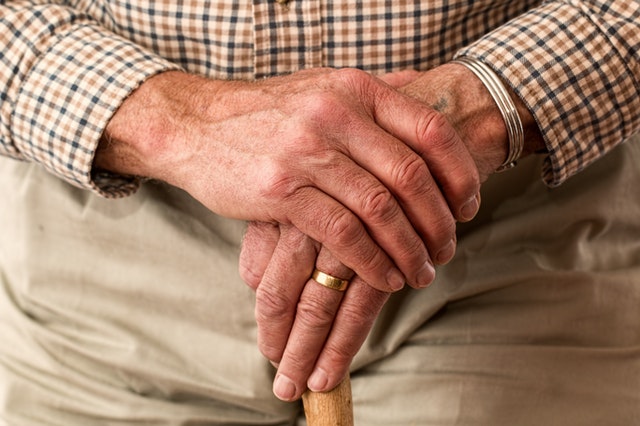
Elder Abuse and Neglect in Nursing Homes
This article has been reviewed by a practicing attorney in 2020
This content is not intended to be a substitute for professional legal advice. Always seek the advice of an attorney or another qualified legal professional with any questions you may have regarding your situation.
Moving a loved one into a nursing home can be an emotional undertaking. Your elder may protest leaving their home, but you know it is the right move for them and for you as their caretaker. Importantly, when making this move, you want to ensure that your loved one is properly cared for and physically, emotionally, and financially safe. Unfortunately, elder abuse and neglect can occur in nursing homes across the country.
The goal of this article is to provide information regarding elder abuse so you can be armed with the knowledge you need to protect your loved one. This article will help you understand the types of elder abuse and common perpetrators. It will also provide you with information to help prevent elder abuse as well as options concerning how to proceed should you believe your loved one has been abused or neglected.
6 types of elder abuse and common signs of each
The Centers for Disease Control and Prevention (CDC) defines “elder abuse” as “an intentional act or failure to act that causes or creates a risk of harm to an older adult.” A person aged 60 or above is considered an “older adult.”
When your loved one is in a nursing home, it is important for you to remain vigilant regarding their health and safety. If your loved one’s mood has suddenly and inexplicably changed and/or they’re regressing in their behaviors or are withdrawn without any explanation, it is possible they are being or have been abused. While not exhaustive, the 6 common forms and signs of elder abuse or neglect are discussed below:
1. Physical abuse
Physical abuse is perhaps the most common form of abuse that comes to mind. Physical abuse occurs when another person acts intentionally to cause physical or bodily harm to the elder.
Intentional acts of harm can include: hitting; slapping; punching; pushing; kicking; burning; forcibly feeding; or inappropriately restraining or confining an elder. It can also include intentionally administering the incorrect medication or dosage to an elder. Bodily harm includes any type of illness; pain; injury; or functional and/or cognitive impairment that the elder may suffer.
Common signs of physical abuse include: black eyes and/or bruising on the body; cuts, lacerations, or open wounds; broken bones; evidence of burning or scarring on the skin; or broken eyeglasses.
2. Emotional/psychological abuse
Emotional/psychological abuse is nonphysical abuse that can be inflicted on an elder. This type of abuse includes verbal and nonverbal actions, which cause the elder psychological and emotional harm, including fear, anxiety, or distress.
Examples of verbal emotional abuse include an individual screaming hurtful words at the elder to humiliate them; threatening the elder; or manipulating the elder. Nonverbal psychological abuse can include intentionally isolating the elder from friends and family to cause distress.
Common signs of emotional/psychological abuse include: a change in your elder’s behavior such as being nervous, anxious, or withdrawn. Any behavior that mimics dementia (that is not dementia) such as rocking, mumbling to oneself, or sucking.
3. Sexual Abuse
Sexual abuse is any form of non-consensual sexual act or contact with an elder. Sexual abuse can include, but is not limited to, physical contact such as rape, sexual assault, or non-consensual masturbation.
Sexual abuse can also include nonphysical contact such as subjecting an elder to pornographic material, forcing him or her to watch sexual acts, forcing the elder to undress, indecent exposure, or sexual harassment or teasing.
Common signs of sexual abuse include: bruising around the breasts or genitals; dramatic changes in mood or behavior; any unexplained vaginal or anal bleeding; unexplained venereal disease or genital infections; difficulty walking or standing; or torn or bloody underwear.
4. Financial abuse
Financial abuse occurs when an individual intentionally takes an elder’s money or property without their permission.
Examples of financial abuse include: forging the elder’s signature on checks; wiring money from the elder’s bank account to a bank account in someone else’s name; using the elder’s credit card; or stealing the elder’s personal property (ex: jewelry, furniture). Importantly, this can also include altering an elder’s will, trust, or other estate planning document, which would transfer the elder’s property on their death, without their permission.
Common signs of financial abuse include: significant changes to the elder’s financial accounts, such as sudden and substantial withdrawals; money or valuables missing from the elder’s physical possession; new subscriptions appearing on the elder’s bank account or credit cards (Amazon, Netflix, Hulu, etc.); charges to bank accounts or credit cards for items the elder does not use; suspicious changes in testamentary and estate planning documents such as wills, powers of attorney, life insurance policies, etc.
5. Healthcare fraud and abuse
Healthcare fraud and abuse can occur if doctors, nurses, and other professional caregivers are dishonest regarding the care they provide to the elder.
This type of fraud can include: charging for healthcare services, which were not provided; over-billing; receiving kickbacks/payment for referrals to other providers or for prescribing certain drugs; and Medicaid fraud.
Common signs of healthcare fraud and abuse include: unexplained changes in medication and overmedication of the new treatment; duplicate billings for one medical service or device; refusal to discuss your elder’s care with you even when you have a healthcare power of attorney over them.
6. Neglect
While not abuse per se, neglect occurs when a caregiver fails to provide adequate care to the elder. Many times, our elders are unable to maintain their physical and/or mental health without assistance from a caretaker. Any caretaker who fails to provide these necessary services to the elder, whether intentionally or unintentionally, engages in elder neglect.
Some common examples include: failing to assist the elder in maintaining proper hygiene; failing to turn the elder in his or her bed to prevent bedsores or pressure ulcers; or failing to provide the elder with food and water.
Common signs of neglect include: unexplained weight loss; malnutrition or dehydration; bed sores or pressure ulcers; soiled bedding or clothes; the elder being unbathed and dirty.
The above information is meant to be general in nature. It is important to understand that each state has its own definition of “abuse.” The American Bar Association provides updated definitions of elder abuse for each state on its website, located here.
Potential perpetrators
Most elders already know their abuser. In a nursing home, it is more common for an elder to suffer abuse from another resident of the facility. However, caregivers, such as nurses, nursing assistants, and social workers are also common perpetrators of elder abuse or neglect.
Statistics on elder abuse
In the 1970s, nursing homes were largely unregulated, and had very little government oversight. Elder abuse was prominent during this time and became a public concern. However, for the decades that followed, research on this issue was flawed and sparse. Fortunately, within the last two decades, the quality and amount of research concerning elder abuse and neglect has improved, but more is still needed. Below are some statistics concerning elder abuse and neglect:
- According to the National Center on Elder Abuse (NCEA), elder abuse is underreported. It is estimated that only 1 in 14 cases are reported. However, recent data from Adult Protective Services (APS) agencies across the country demonstrate an increasing trend in reporting.
- As of 2019, an estimated 1.5 million people resided in nursing homes. However, the CDC predicts a substantial growth in the older population and anticipates that, by 2050, 27 million people will require nursing facilities, alternative residential care places, or home care services.
- A 2015 article in the New England Journal of Medicine estimated that approximately 10% of elders in America suffer some form of abuse, including physical, psychological/emotional, sexual, financial, or neglect.
- In the same article, the authors noted that studies have shown a high prevalence of mistreatment in nursing homes by other residents in the form of physical, verbal, and sexual aggression.
- In 2001, nearly 1 in every 3 United States nursing homes were cited for violations of federal standards that either had the potential to cause harm or caused actual harm to a resident during 1999-2001.
- In a 2001 study of 2,000 nursing home residents, 44% of residents reported they had been abused, and 95% said they had been neglected or seen another resident neglected.
- In a shocking 2010 study, over 50% of nursing home staff admitted to mistreating (physical abuse, mental abuse, neglect) older patients; two thirds of those incidents involved neglect.
- According to data from 2010, 29% of nursing home abuse complaints were of physical abuse; 22% were of resident to resident abuse; 21% were of psychological abuse; 14% were of gross neglect; 7% were of financial exploitation; and another 7% were of sexual abuse.
- Elders with dementia are at a higher risk to suffer abuse.
Prevention
There are some precautions you can take to lower your loved one’s risk of abuse or neglect. Below are some suggestions to help your loved one remain safe:
Screen the nursing home
Before your elder is moved into a nursing home, carefully screen the potential facility and its staff. Think of this as a job interview—you are interviewing the facility and individuals that will house and care for your loved one. If possible, seek references, and speak with other caregivers who already have loved ones in the nursing home in which you are interested.
Tour the facility and be mindful of the mood and demeanor of its current residents. Pay special attention to the staff. Are they friendly? Helpful? How do they interact with current residents? Do they seem cold or distant?
Ask the nursing home’s manager whether the staff receive regular training concerning elder abuse and neglect issues. Understand the nursing home’s policies and procedures. Specifically, what safety protocols have been implemented to prevent resident on resident abuse? What are their reporting policies on elder abuse? How many instances of abuse have been reported at this facility in the last year? Do not be afraid to speak up and ask these questions. You are there to protect your loved one. If the nursing home’s staff refuse to answer your questions or are evasive with their answers, you might consider looking elsewhere.
As an important note, long-term care facilities that receive at least $10,000 in federal funds are required to report reasonable suspicions of elder abuse within 24 hours. Failing to comply with this requirement could result in a substantial monetary fine against the facility.
Once your loved one is moved in…
Randomly stopping in to check on your elder will also help ensure your loved one’s safety. Pay attention to your loved one’s body language and how they respond when around residential staff or other residents. Are they happy and content? Or do they exhibit signs of fear or anxiety?
Importantly, if possible, speak with your elder and listen to their responses. Ask if they feel safe and secure in the facility. Listen to what they say and let them know that they can always come to you with any concerns.
Long-term care ombudsmen
It may also be beneficial for you and your loved one to become familiar with the ombudsman near you. An ombudsman acts as an advocate for nursing home residents and can also educate you and your elder regarding elder care rights and the quality of care expected from nursing homes. Your local ombudsman is also trained to help resolve resident complaints against nursing homes.
Suspicions or confirmed elder abuse
Unfortunately, if your loved one is in a nursing home, you will not be around to protect them 24/7. Below are some helpful procedures to follow if you believe your loved one has been abused:
1. Take immediate action
Elder abuse can lead to physical complications and have long-term psychological effects on your loved one. If you suspect your elder is the victim of abuse it is crucial for you to act urgently to protect them. If your elder requires immediate medical attention, call 911. When speaking with emergency personnel, inform them that you suspect elder abuse. Doing so should alert the proper authorities who will investigate your claim. f you suspect your elder has been sexually abused, do not wash the elder or their clothing, and seek immediate medical attention. Authorities may need to collect DNA samples of the perpetrator from your elder or their clothing.
2. Report the abuse
If you suspect elder abuse but do not believe your loved one to be in imminent danger, you should contact your local APS agency. The NCEA provides direct links to resources in all 50 states for reporting elder abuse. You do not have to know abuse is occurring or has occurred. Your APS agency will investigate your suspicions. Reports are always confidential and can be anonymous.
Generally, there are two types of reporters of elder abuse, mandatory and non-mandatory. States have different definitions of “mandatory” reporters, which usually include, but are not limited to, healthcare professionals such as doctors, nurses, and social workers who are required by law to report abuse. These reporters are required to supply their name and contact information when reporting. Furthermore, in some states, they may be subject to criminal prosecution for failing to report elder abuse when they witnessed or had knowledge of the abuse.
Non-mandatory reporters generally include anyone who knows of, or about the victim such as a friend or family member. Non-mandatory reporters may usually make an anonymous report but are encouraged to provide their name and contact information to help the social worker with the investigation.
Once a report of possible abuse is made, your local APS agency will investigate the claim to determine whether abuse has occurred. If, after initial screening the investigator believes abuse occurred, they will initiate contact with the elder needing assistance and determine what services may help maintain the elder’s health and well-being. It is not mandatory that your elder participate in these services.
3. File charges
If someone has committed elder abuse or neglect, they may be subject to both criminal and civil charges.
In criminal cases, the elder, as the victim, may petition the prosecutor to bring a case against the abuser, the defendant. The prosecutor may also decide on their own to bring criminal charges against the abuser for acts committed against the elder. While the elder may petition the prosecutor to bring criminal charges, the elder is not a party to the lawsuit. However, the elder may be called as a witness to testify in criminal court. Each state has its own definitions of elder abuse, as well as its own forms of punishment. In some states, elder abuse is a felony. If found guilty of elder abuse, the perpetrator could face civil fines and possibly jail time.
4. File a civil lawsuit
In a civil lawsuit, the elder would be considered the “aggrieved” party, also called the plaintiff, and may be able to sue the perpetrator, the defendant, for damages caused by the defendant’s conduct. Damages may include medical bills related to the abuse, and compensation for pain and suffering. In some circumstances, you may be entitled to bring a lawsuit on behalf of your loved one if your elder lacks capacity or is of “unsound mind” to bring their own lawsuit. In this instance, you act as your elder’s “representative” in bringing the case. The representative is often the individual with a power of attorney over the elder or one who is already the representative of the elder’s estate. A representative may also be able to sue the perpetrator/defendant after the elder has died, on behalf of the elder’s estate, as claims against the defendant may outlive the elder themselves.
An elder may also have a case against a third party, such as the nursing home or the nursing home’s parent company, through respondeat superior. Respondeat superior is the legal doctrine meaning that another individual or corporation may be vicariously liable for the acts of its agents/employees. To be vicariously liable means that the third party is liable for the unlawful acts of its agents (employees) even though the third party did not commit the act. For example, Nursing Home A hires John Doe who is a nurse assigned to care for your mother. John Doe punches your mother, breaking her arm. John Doe is liable for your mother’s injuries, but Nursing Home A may also be liable for her injuries because John Doe is its employee who acted unlawfully.
The nursing home may also be liable for harm caused to an elder if the facility engaged in negligent hiring practices, failed to implement safety policies and procedures, and/or failed to adequately train staff and employees.
Meeting with a nursing home abuse lawyer
The above information is meant to be an overview concerning nursing home abuse and neglect so you may better protect your elder from harm. It should not be considered legal advice. If you are considering filing a lawsuit against a perpetrator and/or nursing home, it is crucial that you speak with an attorney as soon as possible so you do not miss any court filing deadlines. It is also important to remember that elder abuse laws vary on a state by state basis. Therefore, it is imperative that you seek a local attorney who specializes in personal injury lawsuits, particularly related to nursing home abuse.
Citations:
- Preventing Elder Abuse, Centers for Disease Control and Prevention, www.cdc.gov
- Elder Abuse, National Institute on Aging, www.nia.nih.gov
- Elder Abuse and Neglect, Help Guide, www.helpguide.org
- State Resources, National Center on Elder Abuse, ncea.acl.gov
- Facts and Statistics, National Association of Nursing Home Attorneys, nanha.org
- Abuse of Residents of Long Term Care Facilities, National Center on Elder Abuse, ncea.acl.gov
- Mark S. Lachs, M.D., M.P.H. and Karl A. Pillemer, Ph.D., Elder Abuse, New England Journal of Medicine, www.nejm.org
- Nursing Home Care, Centers for Disease Control and Prevention, www.cdc.gov
- How to Find a Long-Term Care Ombudsman Program, the National Consumer Voice for Quality Long-Term Care, theconsumervoice.org
- Get Help, National Adult Protective Services Association, www.napsa-now.org
- Types of Abuse Defined in Adult Protective Services Statutes (April 2020), American Bar Association, www.americanbar.org
Related Articles

Elder Law Attorneys: A Comprehensive Guide
If you are someone who is taking care of a senior or has an elderly loved one, you should consider working with an elder law attorney. Though you may not expect it, individuals begin to face new and more complex legal concerns as they get older. Actions that may have seemed trivial when they were […]

Trusts: What is One and How do They Work?
Estate planning is an integral part of planning for seniors. There are many different forms of estate planning and various tools available to use. One estate planning tool that can be helpful for many seniors is a trust. They can serve many different purposes and are a great estate planning tool, regardless of your estate’s […]

Burial Insurance: Everything You Need to Know
If you have an elderly loved one, you may be considering burial insurance. This is a type of life insurance that specifically covers final expenses. A 2020 report on life insurance policyholders found that 84% of those that buy life insurance, do so to cover end-of-life expenses. Considering that the majority of people who have […]

Where There’s a Will, There’s a Plan
This article has been reviewed by a practicing attorney in 2020 This content is not intended to be a substitute for professional legal advice. Always seek the advice of an attorney or another qualified legal professional with any questions you may have regarding your situation. There are many types of estate planning documents you can […]

Transfer on Death Deeds: A Complete Overview
Deciding how you want your assets and estate distributed on your death can be an emotional task. Analyzing the legal mechanisms to accomplish this task can be overwhelming and exhausting. You want to be sure your assets will be distributed in accordance with your final wishes, but you also do not want to burden your […]

Lady Bird Deeds: A Complete Overview
This article has been reviewed by a practicing attorney in 2020. This content is not intended to be a substitute for professional legal advice. Always seek the advice of an attorney or another qualified legal professional with any questions you may have regarding your situation. A deed is a formal legal document that, when signed […]